Iranian-American Playwright Wins Pulitzer Prize

An Iranian-American playwright has won the prestigious Pulitzer Prize 2023 for drama.

An Iranian-American playwright has won the prestigious Pulitzer Prize 2023 for drama.
Sanaz Toossi won this year's Pulitzer Prize for Drama, which includes a $15,000 prize, for English, a drama about linguistic and cultural misunderstandings.
The Pulitzer described Toossi’s play as “a quietly powerful play about four Iranian adults preparing for an English-language exam in a storefront school near Tehran, where family separations and travel restrictions drive them to learn a new language that may alter their identities and also represent a new life.”
In addition to their frankness and humor, Toossi's plays are renowned for capturing the voices of their characters, particularly women.
Toossi’s play also won the Steinberg Playwright Award and the Laurents/Hatcher Foundation Award in 2020.
Sanaz Toossi is an Iranian-American playwright from Orange County, California. Her plays include the critically acclaimed, award-winning English and Wish You Were Here.
The Pulitzer Prize is an award administered by Columbia University for achievements in newspaper, magazine, online journalism, literature, and musical composition within the United States.
It was established in 1917 by provisions in the will of Joseph Pulitzer, who had made his fortune as a newspaper publisher.
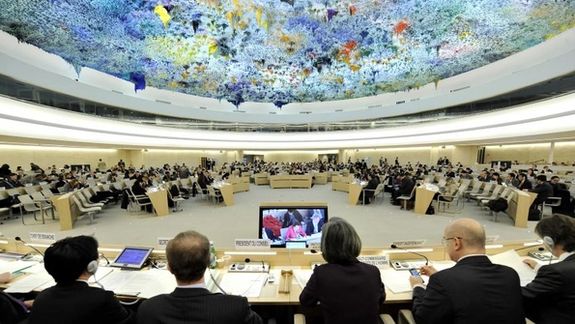
The United Nations says Iran has executed 209 people so far this year, calling the record "abominable".
Ravina Shamdasani, a spokesperson for the UN human rights office, made the remarks during a press briefing in Geneva on Tuesday.
She said that UN Human Rights chief Volker Türk had expressed dismay at the frighteningly high number of executions this year.
"On average so far this year, over 10 people are put to death each week in Iran, making it one of the world's highest executors,” she said.
“This is an abominable record, particularly when you consider the growing consensus for universal abolition of the death penalty.”
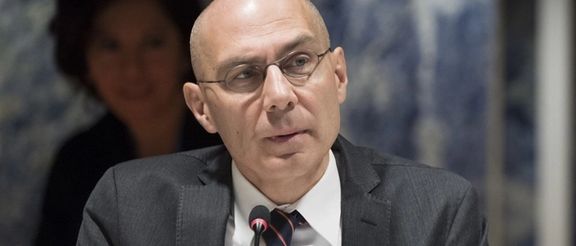
Two Iranians jailed for insulting religious entities were hanged on Monday, strengthening speculations that the Islamic Republic has embarked on a killing spree to intimidate people against further protests.Moreover, Iran executed Iranian-Swedish political activist and former leader of the Arab Struggle Movement for the Liberation of Ahwaz (ASMLA) Habib Chaab (Asyud) on Saturday for “corruption on earth”.
A group of six female activists, including prominent civil activist Narges Mohammadi, Sepideh Gholian, and Golrokh Iraee, imprisoned in Tehran’s notorious Evin prison issued a statement Monday, condemning the execution spree by the regime, claiming it will not deter those fighting the region.
"The continuation and acceleration of the execution of death sentences in recent days is the government's attempt to suppress people and create fear and terror,” they said.
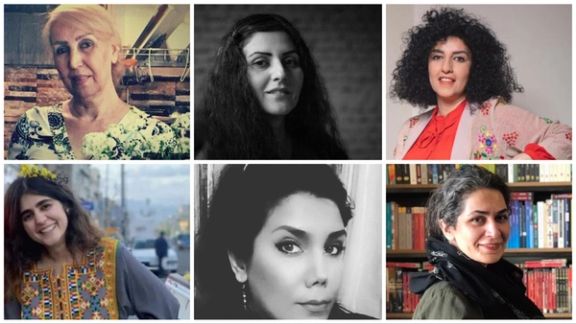
Since September, when the regime’s hijab enforcers beat to death 22-year-old Mahsa Amini, Iran has been a scene of regular rallies, the boldest since the establishment of the Islamic autocracy.
Well over 500 people, including at least 60 minors, were killed during the clashes with about 20,000 arrested. Several people were executed following trumped-up charges by the country’s judiciary.
Noting that a large number of the executions pertained to drug-related offences with a disproportionately high number representing minorities, Türk said: “Imposing the death penalty for drug offences is incompatible with international human rights norms and standards.”
According to Haalvsh website, a local news outlet that monitors rights violations in Iran's Baluchestan region, at least 26 members of the Baluch minority have been hanged in the past nine days, reflecting the renewed vigor with which the regime is targeting the notoriously anti-regime minority.
Iran has always been among the top countries in terms of the number of capital punishment. Recently, however, the government has intensified its reign of terror with expedited procedures for executions, which are growing exponentially.
Right groups have described the promptness of the regime’s executions of Baluch prisoners in recent weeks as “an official policy to intimidate protesters in Sistan and Baluchistan province.”As Sunni Muslims, Baluch citizens are both an ethnic and religious minority. Estimates of the Iranian Baluch population range from 1.5 to 2 million people.
The Baluch community – along with the Kurds -- has always been among the most persecuted minorities of Iran, and has the largest number of people executed in the country. Most of the Baluchs are executed over drug-related charges, but activists say their cases do not receive due process through a fair trial and that the regime uses drug charges as a pretext to avenge 30 consecutive weeks of widespread protests after their Friday prayers.
In its Tuesday press release, the office of the high commissioner for human rights confirmed that the exact number of executions is unknown due to lack of government transparency, and the figure is likely to be higher.
“At this rate, Iran is worryingly on the same track as last year when around 580 people were reportedly executed,” Türk added. The High Commissioner also urged the Iranian authorities to establish a moratorium on executions with a view to abolishing the death penalty though as numbers soar, this looks unlikely.
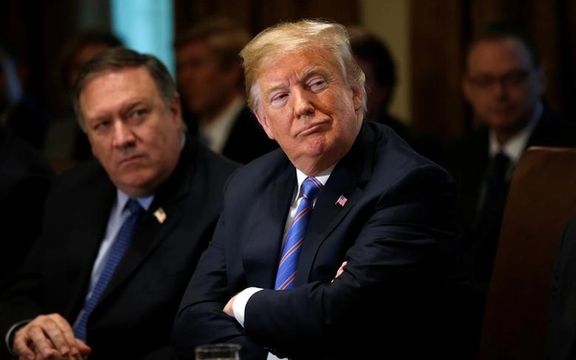
Tehran has issued arrest warrants for former US President Donald Trump, Secretary of State Mike Pompeo and 71 others for the assassination of Qassem Soleimani.
Ali Salehi, Tehran's prosecutor general, issued arrest warrants on Monday for dozens of US officials involved in the assassination including Trump, Pompeo, and former Head of CENTCOM General Kenneth Franklin McKenzie.
On January 3, 2020, the US military, on the order of President Donald Trump, killed Soleimani in a drone strike near Baghdad International Airport, saying that he had been "actively developing plans to attack American diplomats and service members in Iraq and throughout the region."
Soleimani, who was Iran’s top military and intelligence operator outside its borders, was in charge of supporting and organizing militant proxy forces, including the Lebanese Hezbollah and Iraqi Shiite militia groups that have repeatedly attacked US forces.
“Those convicted of involvement in the crime must be sentenced by a competent court under the guilty plea,” Salehi added.
The official stated he sent requests for judicial cooperation to nine countries that might have played a role in the assassination.
In 2020, Iran issued an arrest warrant for US President Donald Trump and 35 other people over the drone strike that killed a Soleimani.
Tehran had also asked Interpol to issue a Red Notice for the 36 individuals but the request was dismissed, explaining it was not in accordance with its rules and constitution. It said: “It is strictly forbidden for the organization to undertake any intervention or activities of a political, military, religious or racial character.”
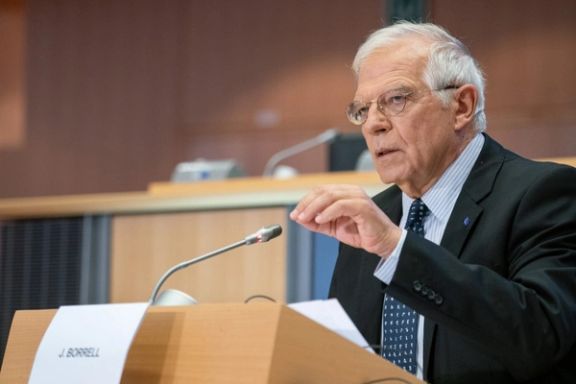
The EU foreign policy chief spoke to his Iranian counterpart condemning the execution of foreign nationals.
Josep Borrell said in a tweet on Monday that he has discussed the recent execution of Swedish-Iranian national Habib Chaaband and urged Iran not to execute German-Iranian Jamshid Sharmahd.
Speaking with Hossein Amir-Abdollahian over the phone, he said the pair discussed Iran-IAEA cooperation, which he said had gained momentum recently.
“I stressed that Iran must continue this, end support to Russia’s war against UA, and stop instrumentalizing EU nationals,” he wrote.
Iran executed Iranian-Swedish political activist and former leader of the Arab Struggle Movement for the Liberation of Ahwaz (ASMLA) Habib Chaab (Asyud) on Saturday for “corruption on earth”.
Chaab, 49, was put on trial by a revolutionary court in Tehran in December. He was not allowed to choose his own defense attorney and was represented in his trial by a court-appointed lawyer. He was also forced under duress to make self-incriminating confessions.
Iranian authorities say Chaab was found guilty of leading ASMLA (Harakat al-Nidal in Arabic), a movement which advocates the separation of southwestern Khuzestan Province and for plotting "numerous bombings and terrorist operations" in the oil-rich province with a large Arabic speaking population.
In less than 48 hours, two Iranians jailed for insulting religious entities were also hanged amid global outrage and a killing spree which has seen around 200 executions this year so far.
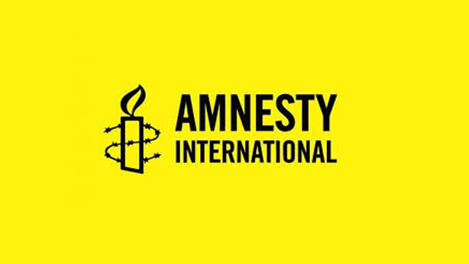
Amnesty International condemned the execution of two Iranian bloggers executed for blasphemy.
The human rights body said the brutal act only furthers Iran’s pariah status, the two youths hanged solely for social media posts in a grotesque assault on the right to life and freedom of religion.
Iran’s judiciary news website Mizan reported on Monday that Yousef Mehrdad and Sadrollah Fazeli Zare were executed for blasphemy, insulting Islam, its prophet, and other sanctities.
Mehrad, a father of three, and Fazeli-Zare', the caretaker of his mother, were arrested in May 2020 over blasphemy-related charges after authorities accused them and five others of being members of a Telegram channel titled "Critique of Superstition and Religion."
Members of the group reportedly expressed opinions about Islam and its Prophet Muhammad that were deemed insulting by the Islamic Republic.
“The use of the death penalty for such acts is another nail in the coffin of religious freedom in Iran,” stressed Amnesty.
Norway-based monitoring group the Iran Human Rights Organization (IHR) said on Saturday that the Islamic Republic has carried out at least 42 executions in the past 10 days alone, or one person every six hours. At least 194 people have been executed this year so far.
“Without urgent international action, the Iranian authorities will continue to deploy the death penalty to torment and terrorize the entire population, crush protests and other forms of dissent, and enforce silence and subservience through brute force,” Amnesty said
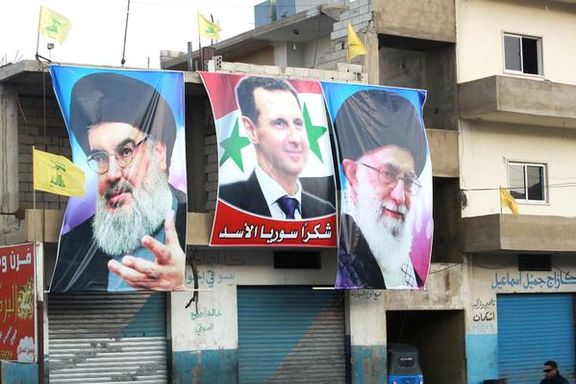
Iranian-backed militia forces in Syria have started removing Islamic Republic's flags from their bases, apparently by the request of the government in Damascus.
The Britain-based Syrian Observatory for Human Rights reported Monday that Tehran-linked militias such as LiwaZainebiyoun and Liwa Fatemiyoun are removing the Iranian flags as well as banners of prominent figures upon a request by Damascus.
The symbols of Iran and its proxies are being removed from the cities of Abu Kamal and Mayadin in Deir ez-Zor governorate and Palmyra in Homs. The banners and flags were replaced with the internationally recognized Syrian flag.
According to the observatory, the development came as part of the Syrian regime's pledge to Arab countries as one of the conditions to rejoin the Arab League, and that Damascus has accepted that Iran-backed militias exit the country. However, the war monitor noted that none of the members of the Iranian-affiliated forces have withdrawn from Syrian territories.
The removal of the flags coincided with Iranian President Ebrahim Raisi's visit to Damascus last week, and the signing of a “long-term strategic comprehensive cooperation” deal in addition to 14 other agreements, and renewing allegiance with groups fighting against Israel.
Official Arab sources have not mentioned any condition put forth for removing. the flags. It is possible however that Iran is trying to keep a lower profile in Syria.
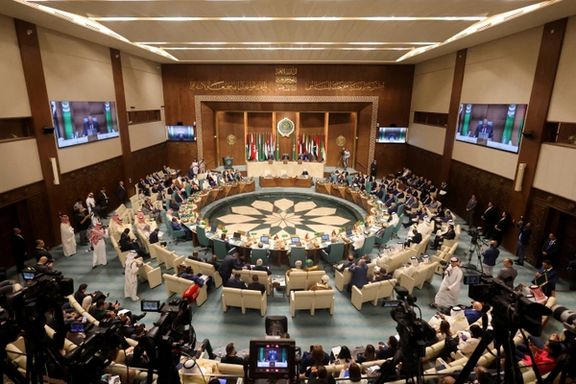
At the same time, it can only be a tactic to avoid frequent Israeli attacks on their bases.
The Arab League readmitted Syria on Sunday after about 13-year-long suspension as President Bashar al-Assad pushes to normalize ties with other Arab nations. Syria had been barred from the organization in 2011 after a brutal government crackdown on anti-Assad protesters, which led to the country’s war.
Foreign ministers from the 22-nation group voted for Syria’s return at a meeting in Cairo ahead of the Arab League summit in Saudi Arabia on May 19.
The Iranian militias removed their flags that were raised on top of buildings in Ayash warehouses in western Deir ez-Zor countryside, concurrent with the arrival of commanders of Iran’s Revolutionary Guards – IRGC -- and Lebanese Hezbollah to Qasem Soleimani camp in the countryside, the observatory said in another report.
The group claimed that a convoy comprised of 12 four-wheel-drive cars of IRGC officers set off from Al-Joura neighborhood on Sunday to Ayash warehouses, where they met with Hezbollah members. “The Iranian militias repositioned and changed their military headquarters in fear of being attacked, following the recent strikes ton their positions,” the observatory claimed.
The restoration of ties with Damascus quickened following the deadly February 6 earthquake in Turkey and Syria, and the Chinese-brokered détente between Saudi Arabia and Iran, which had backed opposing sides in the Syrian conflict.
Emphasizing that the crisis in Syria is not yet over, the Arab League called for resolving the crisis resulting from Syria’s civil war, including the flight of refugees to neighboring countries and drug smuggling across the region.
On Monday, Jordan carried out rare airstrikes on southern Syria, hitting an Iran-linked drugs factory and killing a smuggler allegedly behind big hauls across the two countries' border, local and intelligence sources said.
Almost all of the strikes against Iran-aligned forces in Syria have been carried out by Israel since 2017, which has vowed to prevent the Islamic Republic’s entrenchment in the country. Israeli strikes in recent weeks have seen key Iranian military figures killed from the Revolutionary Guards and the Quds Force.